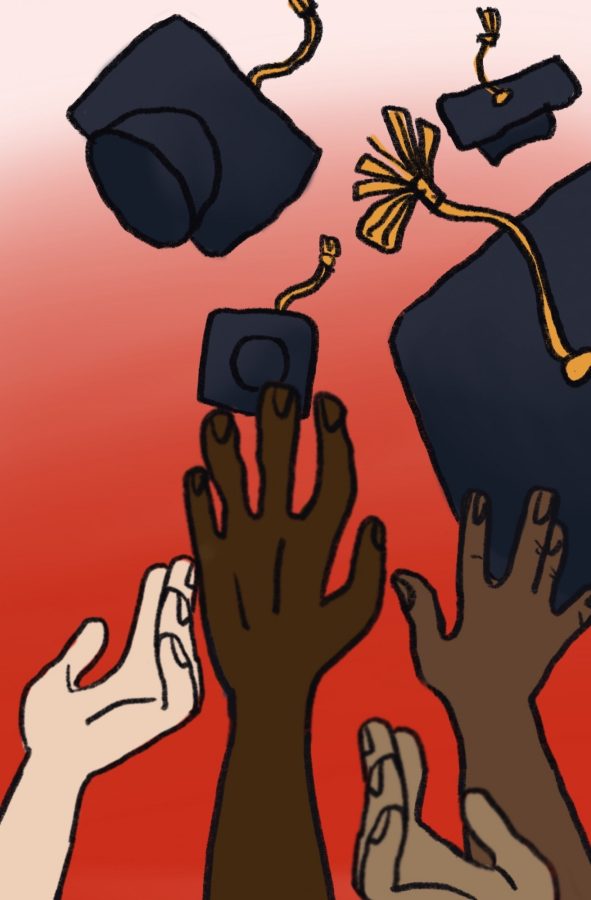On Friday, May 13, 4,600 graduating students and 36,000 guests gathered in the University of Arizona Stadium for the 158th commencement ceremony. It started with a pre-commencement show, featuring stories from various figures from the university.
The field was set up with a large podium in the middle, surrounded by six sections of seating. The setup was an adjustment from past graduation ceremonies in the hopes that it could encourage people to spread out in the stands.
The ceremony officially began at 7:30 p.m., with a long procession of university leaders, professors and graduate students, followed by a recitation of the national anthem by a group of five graduating seniors in the School of Music, a welcome and congratulations in both English and Spanish and the obligatory land-stewardship recognition.
Brief speeches were given by various university leaders, including Senior Vice President for Academic Affairs and Provost Liesl Folks and the 2021-2022 Student Body President Noah Vega.
This was followed by an award ceremony, where the Merrill P. Freeman Medals, Robie Gold Medals, Robert Logan Nugent Awards and the Provost Award were all handed out to graduating seniors — each award punctuated by resounding smacks as President Dr. Robert C. Robbins clapped into his microphone. Five honorary degrees were also given to outstanding members of the university community, capped off by a brief speech by the Chair of the UA Alumni Advisory Council Shelley Huff.
The keynote speaker of the evening arrived next: Dante Lauretta, principal investigator of NASA’s OSIRIS-REx mission, University of Arizona graduate and regents professor of planetary science.
“It’s like a dream come true,” Lauretta said to the Daily Wildcat before his speech. Decades ago, he had attended his own graduation ceremony at the University of Arizona.
Lauretta empathized with the graduating seniors, and said after the OSIRIS-REx mission returns in 2023, “I don’t know what I’m doing next.”
The University of Arizona’s team announced on Monday that they had won another $200 million grant money for their work, which would guarantee that the University’s presence in the aerospace industry would continue for years to come, with Daniella DellaGiustina — one of professor Lauretta’s own students and mentees — taking over the program.
Lauretta was unafraid to face that uncertainty since he had a value which had animated and driven him forward over the years, which he wished to share with the students, and summarized in his own words simply as, “Say yes to opportunity.”
And Lauretta’s speech certainly delivered, kicking off with an awe-inspiring roar as it played the footage of the OSIRIS-REx mission takeoff, which he built into a metaphor of launching. “This is your moment … this ceremony launches you onto your personal journeys. You are launching into the space of your future.”
“Reach out for support and mentorship. Those of us who have plowed the road ahead of you are eager to share our knowledge and prepare you for the challenges and opportunities to come,” said Lauretta, making a point that holds particular weight, given that one of his own mentees is soon to take over the near-earth asteroid program when Lauretta steps down.
“Thousands of people came together from all over the world to make OSIRIS-Rex a success,” Lauretta said.
The OSIRIS-REx mission seeks to sample matter from a near-earth asteroid that could contain information on the origins of life itself. Furthermore, the mission seeks to gather information on asteroids that could potentially hit earth one day, as well as evaluate the potential that the asteroid has for mining.
Lauretta is an advocate for keeping these large missions in a university setting, where future scholars and workers can engage with the work in a way that won’t happen in an industrial setting.
Lauretta’s speech was followed by the conferring of degrees by Robbins, starting with doctorate degrees, then master’s degrees and finally bachelor’s degrees, with the head of each school calling for the appropriate students to stand and be recognized in turn.
The commencement ceremony was finalized by a barrage of fireworks.
Follow the Daily Wildcat on Twitter









